This is an article I wrote for Naropa’s Sycamore (our new student run newspaper) in its entirety, as it will be run with a significant amount edited out due to print space restrictions. FYI this article covers my experience in breath not depth here. I will continue to go more in depth in my experience as the coming weeks unfold…
I’ve got to be honest, I’m much more comfortable letting the camera do the talking from a journalistic standpoint, especially coming the from the still very raw and undigested state I’m finding myself in. However, with that being said, I’ll just start out saying the phrase “hit the ground running” doesn’t even come close to the whirlwind experience of arriving in Nicaragua. Our first two days in the capital city of Managua consisted of going to clinics and shelters (one where we actually helped serve lunch), a landfill community called La Chureca, the conducting of neighborhood door to door visits, a stop at the first fair trade shop (apparently in the world), and a trip to a village (consisting of primarily relocated residents of La Chureca) where we played games with children. At every location we visited we were thrown into conducting interviews with nearly everyone we encountered; once even rushing to catch up with sweatshop workers as they left the factory between shifts. Awkward and difficult at first, we soon grew into the reoccurring habit. In Managua we also visited a university, an elementary school and shuttled back and fourth to the airport many times to hunt down a few lost bags and some delayed students… The next ten days were spent far in the north of the country in the Jalapa Valley, about 20 kilometers from the boarder of Honduras where we lived with host families as we worked along side PIEAT and members of the local community of La Tierra Promitera- “The Promised Land”.
Once in Jalapa, we participated in the construction of a school for children as well as planted gardens and explored sharing some contemplative practices (such as yoga and other relaxation techniques) with the locals as well as continuing to conduct more one on one interviews. Mostly with the help and guidance of our wonderful translators, many of who were members of PIEAT.
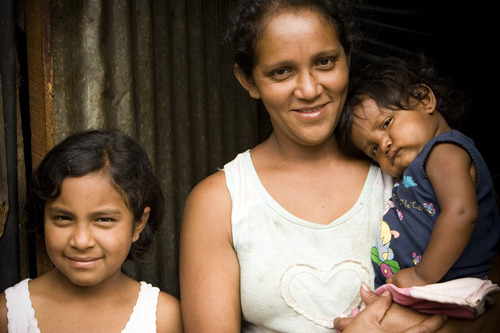 Local residents of La Tierra Promitera (“The Promised Land”), during a house visit the mother voiced concerns for her infant daughter’s health because of an apparent diagnosed heart condition. She hopes PIEAT can help her find more support or resources for healthcare.
Local residents of La Tierra Promitera (“The Promised Land”), during a house visit the mother voiced concerns for her infant daughter’s health because of an apparent diagnosed heart condition. She hopes PIEAT can help her find more support or resources for healthcare.
We got a chance to visit local tobacco barns and the factories where cigars were made, where a significant population of Jalapa works in these, or similar conditions.
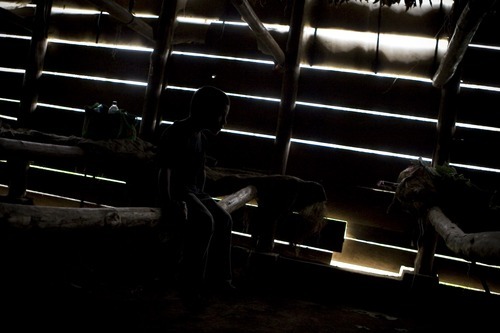 Possibly the son of a tobacco barn worker or could very well be one himself. A whole days work consists of stringing together pesticide covered tobacco leaves for what equals roughly $4 US.
Possibly the son of a tobacco barn worker or could very well be one himself. A whole days work consists of stringing together pesticide covered tobacco leaves for what equals roughly $4 US.
Exposure to such conditions was an important and yet similarly frightening thing to see, much like an experience of a tour we got inside a local hospital too.
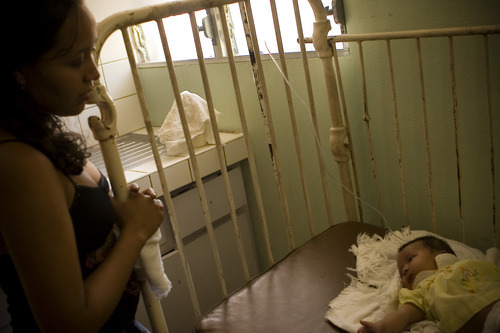 The Mothers often do not breast-feed infants because it is seen as a privilege in their culture to be able to afford the infant formula, and because of this infants often suffer various health consequences like this infant seen here. Note : a bottle of milk on the counter.
The Mothers often do not breast-feed infants because it is seen as a privilege in their culture to be able to afford the infant formula, and because of this infants often suffer various health consequences like this infant seen here. Note : a bottle of milk on the counter.
Only one day was spent away from our work in Jalapa, when we got a chance to spend a night up in a remote mountain village and then make the (sweaty) five-hour hike down the following day. Having such a diverse exposure to so many different people, and situations was no doubt amazing and life changing for us all.
My personal reasons for going down to Nicaragua were really based in a desire to put theory into practice. To confront my own assumptions and ideas of what poverty was, while expanding my knowledge of such things both conceptually and contextually.
Unlike any other travel experience, I had to immerse myself in the culture and foster a reciprocal relationship with the people on the land. Empowered by a demand for hands on participatory action research, I found it necessary to delve deeply into the stories of people’s lives and their personal experiences. It became so important to ask hard questions and listening deeply. I found myself face to face with the realities of poverty, ecological destruction, socio-economic and gender discrimination existing in a more contrasted, real and concrete way for me than ever before. In the past it might have been easy for me to ignore or have been blind to such issues in the abstract context of the classroom, or in the context of life in Boulder (just because it is so familiar by now), but here these things visceral grabbed my attention and wouldn’t let go.
When I had my hands in the earth, planting fruit trees along side the mothers and daughters, husbands, sons and brothers of La Tierra Promitera (“The Promised Land”); feeling the sweat, seeing the smiles, playing with the children, conversing as best I could… this interaction and sharing of space, time and story, added an extraordinary new dimension and level of meaning to the work.
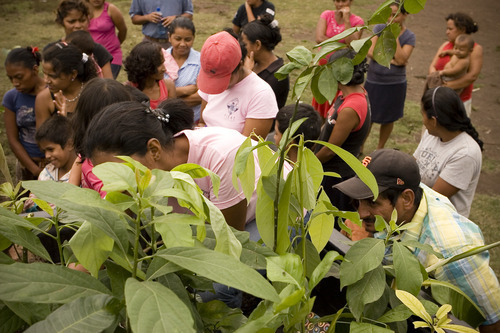 Community members receiving the fruit trees that will be planted in each households yard.
Community members receiving the fruit trees that will be planted in each households yard.
The connections nurtured through dialogue and storytelling all had the backdrop of working on projects with a common purpose, this caused a real inner shift to occur. Something had begun to unravel, for all of us on the trip I think, through the process. It became possible through such work to observe truths that had been missing or obscured from our collective picture of reality. Most of what I have taken away was found in the practicing of this kind of relationship. There was an attempt by all of us, I feel, to breathe into the diverse concrete experiences of living and working along side the people and the land of Nicaragua as best we could.
A great deal about life and poverty in Nicaragua was learned from the family I lived with and those who’s homes and workplaces we regularly visited; mostly through witnessing and participating in the routine of what was their daily life or through the co-creative activities like planting garden beds.
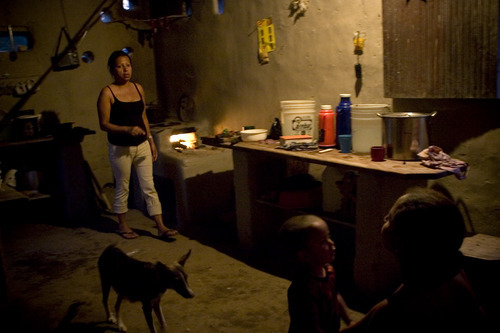 My host family cooking dinner. The mother Alba, Grandmother (forgetting her name) and nephew Elwin, along with their dog Blinky.
My host family cooking dinner. The mother Alba, Grandmother (forgetting her name) and nephew Elwin, along with their dog Blinky.
The lessons were found somewhere in the morning bus rides interacting with the locals, in the sound of my host mother’s voice who tells me quietly, that she must spend 8 months out of the year away from her children working in Costa Rica as a nanny. It was somewhere in the joy of seeing the children smile while learning to play a new game- allowing them to be children again and to forget about the demand of tending to their own siblings.
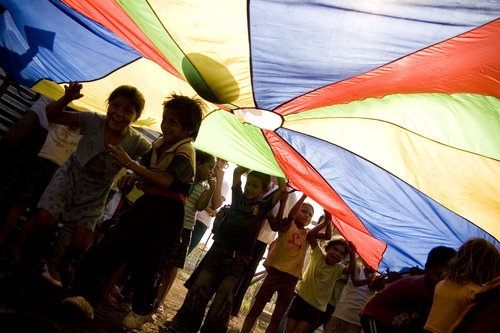 Children of El Tismal playing under a parachute.
Children of El Tismal playing under a parachute.
It was in the handshakes and words of thanks after a house visit or stones were hauled and concrete was mixed and poured. It was there on the faces of those who worked in the fields and in the factories.
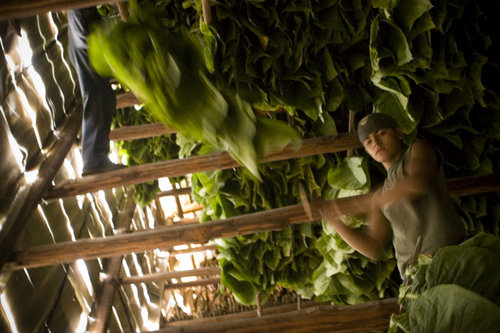 Teens hanging tobacco leaves to dry in the barn.
Teens hanging tobacco leaves to dry in the barn.
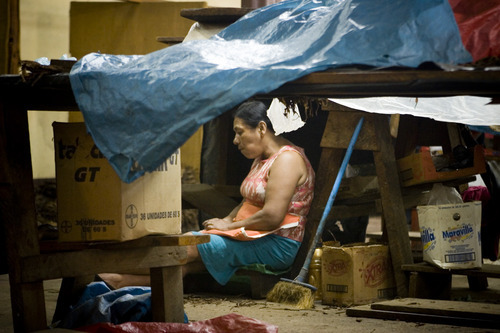 Woman taking her lunch break, working in the tobacco rolling factory.
Woman taking her lunch break, working in the tobacco rolling factory.
It was in simply showing up every day in the community, being present and showing our care by giving the most of what we could, even if it was only to listen and hear their story.
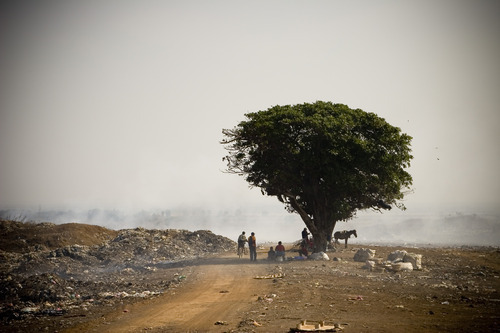 The beginning of an environmental disaster. Relocated residents of La Chureca, who now live in El Tismal have requested garbage be brought to their new location because scavenging for waste such as scrap metal or electronics is currently seen as the only means of employment.
The beginning of an environmental disaster. Relocated residents of La Chureca, who now live in El Tismal have requested garbage be brought to their new location because scavenging for waste such as scrap metal or electronics is currently seen as the only means of employment.
By no means was this trip all about helping people who are helpless, because from what I’ve seen, those people don’t exist. It wasn’t about any one group of people coming to save another, it was about finding some truth through working in mutual responsibility, and that’s something I’ve really awakened to. It’s a humbling experience and a kind of magic that happens when people regardless of background come together united by a desire to change the status quo. I feel we all become liberated just a little bit more when we work in solidarity. This is not to say that things become easier, often times far from it. But this experience has remind me that real change doesn’t come from sweeping legislation or powerful sounding edicts, but in the experience of sharing knowledge and wisdom organically through a heart to heart connection. The experience has showed me just how much time and patients this really takes, and it has also made me believe more so than ever the quote by Gill Scott-Heron which reads ‘Nobody can do everything, but everybody can do something’.